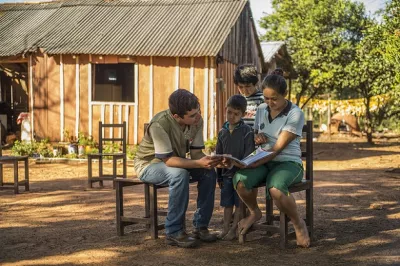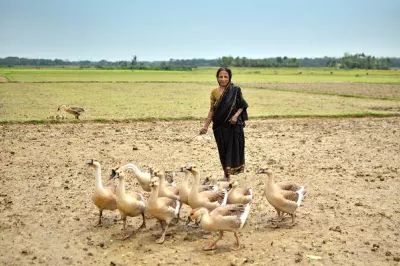Graduation at UNHCR: Protecting the Most Vulnerable Refugees
I work in the Livelihoods Unit at the United Nations High Commissioner for Refugees (UNHCR). For the past few years we have been piloting the Graduation Approach to build sustainable livelihoods for UNHCR’s “people of concern.”
While the Graduation Approach was initially designed for the extreme poor, our team at UNHCR believes that the model holds strong potential for refugees. That is why the Approach is anchored in our Global Strategy for Livelihoods 2014–2018, which aims to bring innovative, market-based methods for building refugee self-reliance to UNHCR operations.

Of course, we have had to adapt. For example, our targeting is tailored to refugee contexts and we build on the socioeconomic criteria UNHCR already established for existing cash-based interventions. Although the cash assistance (consumption stipend), the asset transfer (or links to employment opportunities), and the regular coaching and mentoring may be the same as in the traditional Graduation Approach, we added a strong legal assistance and a psychosocial counseling component, both of which are essential for refugees.
We are also innovating. For example, we are among the first to test the approach in urban settings in Cairo and Alexandria. We chose Egypt because it has the largest number of urban refugees in the world (as of mid-2013, it is home to 183,398 registered refugees). Egypt offers an interesting opportunity to test the Graduation Approach in an urban setting and with two different populations requiring UNHCR responses: an African refugee population in protracted displacement and a Syrian refugee population in an emergency situation. Five hundred participants were originally chosen for the pilot study, from among those already receiving direct cash assistance, giving priority to survivors of sexual and gender-based violence (SGBV), youth, and women to the greatest extent possible. More recently, 1,000 Syrian refugees were included in the program. Along with receiving cash assistance to cover daily life needs, participants are given fixed-amount food vouchers monthly (EGP 300) as well as training and coaching that will enable them to choose one of two pathways to help them move off of cash assistance: self-employment or wage employment. All program participants will continue to receive UNHCR protection.
You can watch the video showcasing how we have adapted the Graduation Approach to refugee contexts here.
UNHCR is implementing the Graduation Approach in five countries in very different contexts, including rural, urban and camp settings, and in both emergency and protracted situations in Egypt, Costa Rica, Ecuador, Burkina Faso and Zambia.
The Graduation Approach provides UNHCR and its partners with a way of linking somewhat disparate program inputs (livelihoods, assistance and others) in a more carefully sequenced and time-bound way to bring improved socioeconomic outcomes. Moving forward, our team is developing a strategy for implementing the Graduation Approach in UNHCR operations based on lessons learned from BRAC and the CGAP–Ford Foundation pilots. We are also assessing monitoring data and analyzing results to establish good practices for the graduation for refugees in order to develop tools and guidelines for UNHCR’s own Graduation Approach.
Today, UNHCR is seeking funding to test the cost effectiveness of the Graduation Approach versus cash and traditional UNHCR interventions in a refugee context. This is especially important to us since UNHCR, like other agencies, is experiencing an organizational shift in certain sectors toward cash-based interventions as a more efficient alternative to traditional programming. The Graduation Approach has been shown through rigorous research to provide extremely poor people with a sustainable pathway out of poverty; however, it has not been rigorously tested in the refugee context, nor in comparison to cash transfers for displaced populations.
We want to convince others that refugees are not an economic burden to host countries. Refugees bring with them useful skills that can contribute to the economy of the host community. They present unexplored economic opportunities.




Add new comment